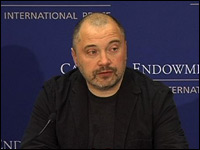Registration
Thank you!
You will receive an email confirming your registration.
IMGXYZ850IMGZYX Carnegie Moscow Center Scholar-in-Residence Nikolai Petrov discussed Russia's March 2 presidential elections, which are widely expected to usher in the rule of Dmitry Medvedev, President Putin's favored successor. Petrov provided analysis of the Putin regime's political structure, the likely policy trajectory of a Medvedev administration, and the problems that Russia's new president will have to tackle. He concluded that Russian politics will change substantially even in the next six months as key Kremlin factions etch out their role in the next administration. Carnegie's James F. Collins moderated the event.
